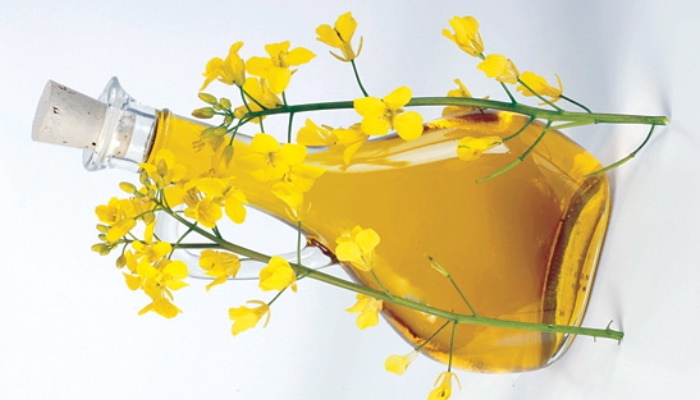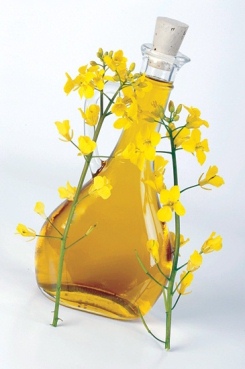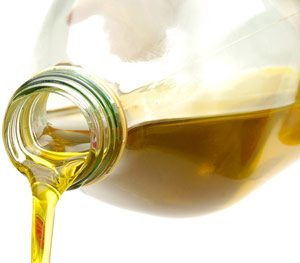
Canola is one of two cultivars of rapeseed or Brassica campestris. Their seeds are used to produce edible oil that is fit for humanconsumption because it has lower levels of erucic acid than traditional rapeseed oils and to produce livestock feed because it has reduced levels of the toxic glucosinolates.
Canola was originally naturally bred from rapeseed in Canada by Keith Downey and Baldur R. Stefansson in the early 1970s, but it has a very different nutritional profile in addition to much less erucic acid. The name "canola" was derived from "Canadian oil, low acid" in 1978. A product known as LEAR (for low erucic acid rapeseed) derived from cross-breeding of multiple lines of Brassica juncea is also referred to as canola oil and is considered safe for consumption.
Canola was developed through conventional plant breeding from rapeseed, an oilseed plant with roots in ancient civilization. The word "rape" in rapeseed comes from the Latin word " rapum ," meaning turnip. Turnip, rutabaga, cabbage, Brussels sprouts, mustard and many other vegetables are related to the two canola species commonly grown: Brassica napus and Brassica rapa. The negative associations with the word " rape" resulted in the more marketing-friendly name "Canola". The change in name also serves to distinguish it from regular rapeseed oil, which has much higher erucic acid content.
Hundreds of years ago, Asians and Europeans used rapeseed oil in lamps. As time progressed, people employed it as a cooking oil and added it to foods. Its use was limited until the development of steam power, when machinists found rapeseed oil clung to water or steam-washed metal surfaces better than other lubricants. World War I saw high demand for the oil as a lubricant for the rapidly increasing number of steam engines in naval and merchant ships. When the war blocked European and Asian sources of rapeseed oil, a critical shortage developed and Canada began to expand its limited rapeseed production.
After the war, demand declined sharply and farmers began to look for other uses for the plant and its products. Edible rapeseed oil extracts were first put on the market in 1956–1957, but these suffered from several unacceptable characteristics. Rapeseed oil had a distinctive taste and a disagreeable greenish colour due to the presence of chlorophyll. It also contained a high concentration of erucic acid. Experiments on animals have pointed to the possibility that erucic acid, consumed in large quantities, may cause heart damage, though Indian researchers have published findings that call into question these conclusions and the implication that the consumption of mustard or rapeseed oil is dangerous. Feed meal from the rapeseed plant was not particularly appealing to livestock, due to high levels of sharp-tasting compounds called glucosinolates.
Plant breeders in Canada, where rapeseed had been grown (mainly in Saskatchewan) since 1936, worked to improve the quality of the plant. In 1968 Dr Baldur Stefansson of the University of Manitoba used selective breeding to develop a variety of rapeseed low in erucic acid. In 1974 another variety was produced low in both erucic acid and glucosinolates; it was named Canola, from Can adian o il, l ow a cid.
A variety developed in 1998 is considered to be the most disease- and drought-resistant variety of Canola to date. This and other recent varieties have been produced by gene splicing techniques.
An Oregon State University researcher has determined that growing winter canola for hybrid seed appears possible in central Oregon, USA. Canola is the highest-producing oil-seed crop, but the state prohibits it from being grown in Deschutes, Jefferson and Crook counties because it may attract bees away from specialty seed crops such as carrots which require bees for pollination.
Canola is the highest-producing oil-seed crop, but the state prohibits it from being grown in Deschutes, Jefferson and Crook counties because it may attract bees away from specialty seed crops such as carrots which require bees for pollination.
Canola was originally a trademark but is now a generic term for this variety of oil. In Canada, an official definition of canola is codified in Canadian law.
Canola oil
Canola oil is made at a processing facility by crushing the rapeseed. Approximately 42% of a seed is oil. What remains is rapeseed meal, ahigh quality animal feed. 22.68 kilograms (50 pounds) of rapeseed makes approximately 10 liters (2.64 US gallons) of canola oil.
Canola is a key ingredient in many of the foods we eat. Its reputation as a healthy oil has created high demand in markets around the world. Canola oil has many non-food uses, and often replaces non-renewable resources in products including candles, lipsticks, newspaper inks, industrial lubricants and biofuels.
The average density of canola oil is 0.92 g/ml.
The rape plant is part of the mustard family, along with turnips, cabbage, watercress, horseradish, and radish.
Characteristic: Canola oil has a light flavor and smooth texture and it has a high heat tolerance.
Uses: Canola oil works well in salad dressings, sauces and marinades, and it also provides a good base for sautéing, grilling or stir-frying meat and vegetables. For bakers, canola fulfills dual purposes, as both a substitute for solid fats, such as butter, and as an effective non-stick agent for pans.
Health benefits
- Canola oil is low in saturated fat, is high in monounsaturated fat, and has a beneficial omega-3 fatty acid profile; it has well established heart health benefits and is recognized by many health professional organizations including the American Dietetic Association, and American Heart Association, among others. Canola oil has been authorized a qualified health claim from the U.S. Food and Drug Administration based on its ability to reduce the risk of coronary heart disease due to its unsaturated fat content.
- Manufacturer said that Canola oil is among the healthiest of cooking oils. It has the lowest saturated fat content of any oil commonly consumed, at just 7%. By comparison, sunflower oil has 12% saturated fat, corn oil has 13%, and olive oil has 15%.
The fatty acid composition of canola oil is consistent with nutrition recommendations aimed at reducing the amount of saturated fat in the diet. Canola oil is characterized by a very low level of saturated fatty acids (< 7% of total fatty acids). It contains a relatively high level of oleic acid (58%) and an intermediate level of PUFA (32%) of which alpha-linolenic acid makes up approximately one-third (i.e., 11% of total fatty acids). Diets containing canola oil have been found equally as effective as those containing corn oil, safflower oil, soybean oil and sunflower oil in reducing plasma total and LDL cholesterol in both normal and hyperlipidemic subjects. Consumption of canola oil also resulted in an increase in long-chain omega-3 fatty acid (viz., EPA) levels of plasma and platelet phospholipids. Ingestion of canola oil also has been found to alter platelet activity and thrombogenesis although the research supporting these observations is not as convincing as the effectiveness of canola oil in lowering plasma cholesterol level. Preliminary studies in animal models also suggest that canola oil may protect against cardiac arrhythmias.
The effectiveness of canola oil in reducing plasma total and LDL cholesterol levels and the observation that it may alter clotting activity and protect against cardiac arrhythmias indicate a beneficial role for canola oil as part of a nutritious diet.
Dangers of Using Canola Oil
Rape seed is the most toxic of all food-oil plants. Insects will not eat it and only a few birds will, though it is thought to shorten their lives because it is deadly poisonous. Canola is a semi-drying oil that is used as a lubricant, fuel, soap and synthetic rubber base and as an illuminant for the slick color pages you see in magazines. Some say it's an industrial oil and does not belong in the body!
Canola is a semi-drying oil that is used as a lubricant, fuel, soap and synthetic rubber base and as an illuminant for the slick color pages you see in magazines. Some say it's an industrial oil and does not belong in the body!
Canola oil has some very interesting characteristics and effects on living systems--it has been tested on rats and mice for several years with worrisome results, but never on humans.
Canola oil was developed in Canada by breeding rapeseed plants that produced much lower levels of erucic acid typically found in rapeseed. Erucic acid is toxic in large amounts. Unfortunately some people misunderstand the difference between canola and rapeseed and there have been email hoaxes and rumors claiming that consuming canola oil is dangerous.
Canola plant contains a high percentage of erucic acid a toxic fatty acids. According to studies this substance can lead to ailments ranging from respiratory problems to blindness in humans. But according to canola oil manufacturers these levels have been reduced significantly through the process of cross-breeding, which replaces the erucic acid with oleic acid (a monounsaturated fat); but even after the processing to reduce or as they said replace the erucic acid content, it is still a penetrating oil. Because of this some health organizations do not recommend use of canola oil in infant formula largely because of concerns over possible accumulation of triglyceride in heart as a result of the small amounts of erucic acid.
SOME THINGS AREN'T QUITE RIGHT WITH CANOLA
There is some legitimate controversy, however, that we need to cover.
More than 60% of the canola crop in Canada (where most of world crop is grown) comes from genetically modified seed. This is plant seeds that have been exposed to radiation to change their genetic or DNA make-up.
Genetic seeds are illegal in Europe and opposed by activists throughout the world because with the current technology there is no way to ensure that genetically modified organisms will remain under control, and the use of this technology outside secure laboratory environments carries potentially unacceptable risks to both farmed and wild ecosystems.
An example of this is a strain of the canola seed from Roundup, a company that deals with planting seeds and produces herbicide spray. That strain is now immune to the herbicide sprays and is continuing to grow in the fields even after trying to be eracatided. The company predicts the plant to have a life expectancy of 10 years of re-growth and are worried about possible cross-breeding in the field that may produce an even more resistant strain with seeds commonly in use now.
Cons:
82% of the Canola crops planted in Alberta, Manitoba, and Saskatchewan are GM ( genetically modified food) herbicide-tolerant varieties.
In 2004, North Dakota produced 91% of the Canola in the United States. The rapeseed blossom is a major source of nectar for honeybees. Canola oil is a promising source for manufacturing biodiesel, a renewable alternative to fossil fuels. The main price-discovery mechanism for worldwide canola trade is the Winnipeg Commodity Exchange canola futures contract. Rapeseed is traded on the Euronext exchange.
Recent development by companies such as BrettYoung Seeds and DSV Canada have enhanced the growth potential of Canola with Bio-Boost by up to 14%.
There's not enough solid evidence to suggest that you should stop using canola oil.
Nutritionally, it's an excellent source of omega-3 fatty acids, and has been shown in many clinical trials to lower LDL cholesterol levels (the type associated with coronary heart disease), and total cholesterol. It's a safe and nutritionally sound choice for cooking but, as with any fat, use it in moderation.
Canola oil is by all accounts, a heart healthy oil that you shouldn't be afraid of because of some Internet scare based on truths that have been bent and twisted out of shape to satisfy a personal agenda, whatever it maybe.
![]()
Disclaimer: This website is for information purposes only. By providing the information contained herein we are not diagnosing, treating, curing, mitigating, or preventing any type of disease or medical condition. Before beginning any type of natural, integrative or conventional treatment regime, it is advisible to seek the advice of a licensed healthcare professional.
Top view
Health Men
19.08.2017
What Will Happen to Your Body if
Chicken eggs possess numerous beneficial properties and can be used
+ View04.07.2017
The Best Greens To Eat
We all know that greens are important to eat and top the list when we
+ View04.07.2017
Eat Daily For Clean Arteries
The other day my dad went to see his doctor. My dad was scheduled to
+ View29.12.2016
5 Foods You Should NEVER Eat On An
Since childhood, we’ve all been told to add as many fruits and
+ ViewHealth Women
19.08.2017
What Will Happen to Your Body if
Chicken eggs possess numerous beneficial properties and can be used in
+ View04.07.2017
The Best Greens To Eat
We all know that greens are important to eat and top the list when we
+ View04.07.2017
Eat Daily For Clean Arteries
The other day my dad went to see his doctor. My dad was scheduled to
+ View29.12.2016
5 Foods You Should NEVER Eat On An
Since childhood, we’ve all been told to add as many fruits and veggies as
+ View

































